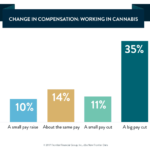Mediation: How to Resolve a Dispute Without Getting the Courts Involved

Change in Compensation: Working in Cannabis
November 5, 2017
2017 Diversity in Cannabis Webinar
November 9, 2017By Adam Foster, partner, Hoban Law Group
Let’s face it: Cannabis and the courts have often had kind of a rocky relationship. Nevertheless, disagreements in business exist, so what are the best options for solving them?
Mediation is a type of alternative dispute resolution (ADR), a blanket term referring to various processes for resolving disputes outside of the traditional court system. Mediation can take many forms, but its most distinctive characteristics are that it is both voluntary and non-binding. The best way to understand the differences is by comparing mediation to a court case.
In a court case, a plaintiff starts by serving the defendant a copy of a legal complaint. That kicks off the formal civil litigation process, with the parties required to comply with certain procedural rules, and deadlines that move the case towards trial. The result will be a judgment on each of the parties’ claims, with winners and losers determined by the judge or jury. With limited exceptions, court filings and court proceedings are open to the public.
Conversely, mediation is a confidential process; in Colorado and many other states, such confidentiality is protected by statute. In mediation, parties to the dispute meet with a mediator: a neutral third party who possesses specialized experience in settling legal disputes, and knowledge of the legal and technical aspects of the dispute.
The mediator’s role is to facilitate communication between the parties in attempt to resolve their dispute outside of court, while helping them move beyond any impasse. Some mediators focus more on facilitating communication between the parties, whereas others concentrate more on evaluating the strengths and weaknesses of the parties’ positions (a forthcoming blog post will offer tips for choosing the right mediator).
The mediator may make recommendations to the parties for resolving their dispute, but the mediator does not have authority to bind the parties to any given settlement, or to order them to act. Therefore, the parties may decide to enter into a binding settlement agreement, but may also choose not to settle, and instead pursue litigation or other options.
In contrast to non-binding mediation, arbitration is another form of ADR. There, a neutral third party (arbitrator) renders a binding decision that can be enforced just as a court judgment would be enforced. Arbitration offers advantages over going to court, by tailoring the litigation process to the needs of the parties. Still, it resembles the court process in terms of setting procedural deadlines for moving the case to hearing, and results in a binding judgment to determine winners and losers.
In Colorado, only about 5% of civil cases filed ever proceed to trial; the vast majority of such settle beforehand. Mediation can help the parties to settle a dispute without the expense of litigation. Mediation also provides certainty by letting the parties agree to terms, and allows them to discuss the dispute in a confidential forum with the help of a qualified neutral mediator. Bottom line? Most parties participating in mediation can enjoy a significant upside, with very little risk.
DISCLAIMER — This information is intended for informational and marketing purposes only; it does not constitute either legal advice or any attorney-client relationship. Anyone interested in representation is welcome to contact Hoban Law Group by phone or email.

Adam Foster, Hoban Law Group
Adam Foster, partner, Hoban Law Group, was among the first attorneys in Colorado to develop specialized expertise in advising cannabis entrepreneurs, and settling marijuana-related disputes. He can be reached at adam@nullhoban.law.




